Copyright Michael D. Robbins 2005
Astro-Rayological
Interpretation & Charts
Quotes
Biography
Images and Physiognomic Interpretation
We would rather starve than sell our national honor.
(Leo Ascendant.)My father was a statesman, I’m a political woman. My father was a saint. I’m not.
(Saturn in Leo conjunct Ascendant. Capricorn Moon. Scorpio Sun.)There exists no politician in India daring enough to attempt to explain to the masses that cows can be eaten.
You must learn to be still in the midst of activity and to be vibrantly alive in repose.Even if I died in the service of the nation, I would be proud of it. Every drop of my blood ... will contribute to the growth of this nation and to make it strong and dynamic.
(Neptune in Leo opposition Moon in 6th house.)You cannot shake hands with a clenched fist.
(Mars in Virgo trine Venus in Capricorn.)All my games were political games; I was, like Joan of Arc, perpetually being burned at the stake.
(Sun in Scorpio in 4th house.)If I die a violent death, as some fear and a few are plotting, I know that the violence will be in the thought and the action of the assassins, not in my dying.
Handwritten statement found in her residence and later used on plaque in the garden where she was assassinated on October 31, 1984, opened to the public 27 May 85Anger is never without an argument, but seldom with a good one.
Forgiveness is a virtue of the brave.Have a bias toward action - let's see something happen now. You can break that big plan into small steps and take the first step right away.
(Mars in 1st house. Taurus MC. Uranus on Descendant.)Martyrdom does not end something, it only a beginning. (Neptune & Saturn in 12th house.)
My grandfather once told me that there were two kinds of people: those who do the work and those who take the credit. He told me to try to be in the first group; there was much less competition. (Moon & Uranus in 6th house.)
People tend to forget their duties but remember their rights. (Saturn in Leo conjunct Ascendant.)
The power to question is the basis of all human progress. (Mercury in Sagittarius.)
Never forget that when we are silent, we are one. And when we speak we are two."
(Mercury in Sagittarius opposition Jupiter in Gemini in 10th house.)Don't ever take a fence down until you know why it was put up.
We have believed--and we do believe now--that freedom is indivisible, that peace is indivisible, that economic prosperity is indivisible.
I suppose leadership at one time meant muscles; but today it means getting along with people. (Leo Ascendant.)
Indira Nehru Gandhi was born on November 19, 1917 and would be the only child of Jawaharlal and Kamala Nehru. Being influenced and inspired by her parents, Indira Gandhi rose to power in India and eventually became prime minister. She dedicated her life to progress in her country despite the overwhelming problems and challenges she encountered.
Her road to power and politics started when she turned twelve years of age. During the time of British imperialism, many Indian National Congress workers from Allahabad did not know when or if the British would arrest them or search their homes. In order to find out when this would occur, the Monkey Brigade was formed. Although Indira claimed to have thought of the idea, some asserted that the Monkey Brigade was the idea of the Congress. In any event, Indira became the leader of this children's group whose purpose was to help end British control in India. Being its leader, she delivered speeches while other children actually warned the people who were going to be arrested. The Congress figured that the British would not suspect children of participating in such involvement. Although some deemed it a joke, Indira took her job very seriously. One of the most significant actions of the Monkey Brigade involved Indira. The Congress party's top officials were organizing a civil disobedience movement. After the meeting, the documents containing the plans of the movement were placed in the trunk of a car with Indira in the back seat. Before the car was ready to leave the area, a police inspector stopped the car in order to search it. However, Indira pleaded with him not to inspect the car because the delay would cause her to arrive late at school. Fortunately, the inspector believed her and the car was not searched.
In 1938, Indira finally joined the Indian National Congress Party, something she always longed to do. Soon afterwards in 1942, she married journalist Feroze Gandhi to whom she eventually bore two sons. Soon after the couple was married, they were sent to prison on charges of subversion by the British. Her first and only imprisonment lasted from September 11, 1942 until May 13, 1943 at the Naini Central Jail in Allahabad.
Fortunately, India won its independence from Britain in 1947. In that same year, Indira's father Jawaharlal Nehru became prime minister and served until his death in 1964. Since her mother had died in 1936, Indira acted as hostess and confidante and traveled with Nehru to meet famous political figures. Later in 1959, Gandhi became the fourth woman elected president of the Indian National Congress. After her father's death, the new Prime Minister Lal Bahadur Shastri appointed Indira Gandhi as minister of information and broadcasting. This position was the fourth highest ranking position in the Cabinet. Many Indians were illiterate. Therefore, radio and television played a major part in informing them. As minister, she most importantly encouraged the making of inexpensive radios and started a family planning program.
After Shastri's death in 1966, Indira Gandhi served as prime minister until India held the next election. She won that election, and in 1967, became one of the first women ever elected to lead a democracy. In 1971, Gandhi was re-elected by campaigning with the slogan "Abolish Poverty." However in 1975, Gandhi was found guilty of violating election laws. Later, the conviction was overturned by the Supreme Court of India. Also, to control population growth, Gandhi implemented a voluntary sterilization program. As a result, adversaries criticized her and her administration in general. To secure her power and because of escalating riots, on June 26, 1975, Indira Gandhi declared a state of emergency which limited the personal freedom of Indians. Also, she ordered the arrests of the main opposition leaders. In her opinion, her dictatorship was for the good of India. But she allowed free elections in 1977, and the Indian people voted her out of office.
She regained her position as prime minister in 1980. Unfortunately on October 31, 1984, Indira Gandhi's Sikh bodyguards assassinated her. They did so to avenge the storming of the Golden Temple in Amritsar. Gandhi had ordered the storming in June because of what her government considered terrorist activity of extremist Sikhs who had occupied the Temple.
As prime minister, Gandhi tried to improve the lives of Indians. With her neighbors, the Soviet Union and China, she improved relations. She also promoted science and technology. In 1971, India sent its first satellite into space. Economically, Indira Gandhi led India to become one of the fastest growing economies in the world toward the end of her time as prime minister.
Gandhi, Indira (1917-1984)
was the first woman prime minister of India. She held the office from 1966 to 1977 and from 1980 until her death in 1984. She was assassinated by two of her security guards, who were members of India's Sikh religious group. Much friction had arisen between the Sikhs and Gandhi's government.Indira Priyadarshini Gandhi was the only child of Jawaharlal Nehru, who served as India's first prime minister from 1947 to 1964. She was an adviser to her father during his term. Gandhi was first elected to Parliament in 1964. She was minister of information and broadcasting from 1964 until she became prime minister.
In June 1975, a court found Gandhi guilty of using illegal practices during India's 1971 parliamentary election campaign. Gandhi's opponents demanded that she resign from office because of the conviction, but she refused. Criticism of Gandhi grew, and she declared a state of emergency two weeks after the court ruling. She had her major opponents arrested and imposed press censorship. In November 1975, the Supreme Court of India overturned Gandhi's conviction. In 1977, Gandhi's Congress (Ruling) Party was defeated in India's parliamentary elections. Gandhi lost both her post as prime minister and her seat in Parliament. Following her defeat, she organized the Congress-I Party. The I in the party's name stands for Indira. In 1980, she won a seat in Parliament, and her party gained control of Parliament. Gandhi again became prime minister.
Gandhi was born in Allahabad. Her maiden name was Indira Priyadarshini Nehru. She attended Santiniketan University in India and Oxford University in England. In 1942, she married Feroze Gandhi (no relation to Mohandas K. Gandhi). Gandhi and her husband were imprisoned for 13 months for their part in India's campaign for independence from Britain. They had two sons, Rajiv and Sanjay. Feroze Gandhi died in 1960. In the 1970's, Sanjay Gandhi became his mother's chief political adviser and gained much power in Indian politics. He was killed in an airplane crash in 1980. Rajiv Gandhi then became a key aide to his mother. When Indira Gandhi was assassinated, the Congress-I Party chose Rajiv as its head. As party head, Rajiv succeeded his mother as prime minister. He held that office until 1989. Rajiv was assassinated while campaigning in parliamentary elections in 1991.
Date of Birth: November 19, 1917
Date of Demise: October 31, 1984
Place of Birth: Allahabad, UP
Prime Minister of India
Tenure Order: 3rd Prime Minister
Political party: Congress (I)
First Term
Took Office: January 19, 1966
Left Office: March 24, 1977
Predecessor: Gulzarilal Nanda
Successor: Morarji Desai
Second Term
Took Office: January 14, 1980
Left Office: October 31, 1984
Early years
She was the only child of Jawaharlal Nehru, the first Prime Minister of India.A brilliant political strategist and thinker, Indira also possessed an extraordinary desire for political power. As a woman occupying the highest position of government in, what was at that time, a very patriarchal society, Indira was expected to be a passive leader, but her actions proved her otherwise.
When her father died in 1964, she was pressured to take up a career in politics. She was elected as a member of Parliament in her father's Indian National Congress Party, and was appointed a minister in the cabinet of Congress Prime Minister Lal Bahadur Shastri. Shastri died in office in 1966, and Indira successfully ran to succeed him as party leader, and thus Prime Minister of India. Initially she was dubbed as goongi gudiya (Hindi for dumb doll), as people thought that she would be a puppet in the hands of other Congress leaders. But she proved them all wrong as she emerged to be one of the strongest leaders in the history of independent India.
As Prime Minister, Indira carefully used every tool available at her disposal to expand her power and authority. By using her powers of appointment, she created "notoriously weak" cabinets, centralizing her own personal authority in a way her predecessors never had.
She created her own independent Congress party following the November 1969 split within the governing Indian National Congress.Re-elected in 1971 – after campaigning fiercely on her well-known platform, with the famous Garibi hatao slogan – she proceeded to boost her government's fortunes through a successful war that December against U.S.-backed neighbouring Pakistan in East Bengal, where India's intervention enabled local separatists to crown their nine-month war of independence with the creation of the independent republic of Bangladesh. President Nixon dispatched the aircraft carrier USS Enterprise to the Bay of Bengal, but the fighting in East Pakistan was quickly over. Moreover the Soviet Union offered its support in case of a confrontation with the US. Thus US intervention failed to materialize for fear of a bigger crisis. Because of this and other similar cooperative ventures, India maintains a nostalgia-tinted warmth in its relations with Russia (after Soviet disintegration) as compared to its relations with the US.
She is also credited with nationalizing the banks in India, a move severely derided by economists at the time, but for which she received immediate approval from the masses. The move reflected the anger of ordinary people at the time as several private banks had collapsed with depositors getting back only a fraction of their money. Moreover a large number of private banks were actually operated by holding companies with wide-ranging business interests and the common man felt the deposited money was being used inappropriately. The nationalized network of banks Gandhi created are successful and widely trusted institutions today. She also took the bold initiative of discontinuing privy purses – personal allowance payments to India's princely states, which she felt were anachronistic given India's democratic post-independence character.
Her efforts at achieving self-sufficiency for India in food grain production – the Green Revolution – achieved consummate success. Her government's initiatives in diversifying and increasing crop yields throughout the country ended India's reliance on foreign food grain imports. It was the success of this Green Revolution that led to her party, the Congress, sweeping the state legislative assembly elections in a number of states in 1972.
Her environmental protection policies were held up an exemplary given India's status as a poor developing country. She initiated both "Project Tiger" (a tiger conservation effort) and regulations aiming to protect habitats on coastal environments on the entire peninsula of India.
Indira Gandhi is considered the initiator of India's nuclear programme; India carried out its first nuclear tests in 1974, supposedly for peaceful purposes. (The second series of tests in 1998 led to the recognition of India's nuclear-weapons capability).
Opponents had long made allegations that her party had practiced electoral fraud to win the 1971 elections. In June 1975 the High Court of Allahabad found the sitting Prime Minister guilty of election fraud, and ordered her to be removed from her seat in Parliament and banned from running for an additional six years. Rather than face the charges, Indira declared a State of Emergency, and in her own words brought democracy "to a grinding halt". Invoking article 352 of the Indian Constitution, she granted herself extraordinary powers and launched a massive crackdown on civil liberties and political opposition. This move was endorsed by Mother Teresa.
Rival party leaders were jailed, and electricity was cut off to opposition newspapers. Opposition-controlled state legislatures were dissolved and suspended indefinitely. The Prime Minister pushed a series of increasingly harsh bills and constitutional amendments through parliament, all which were approved with little discussion or debate.
Indira attempted to re-write the nation's laws with the help of the parliament, thus protecting herself from legal prosecution once emergency rule was revoked. As massive as these reforms were, Indira did not feel her powers were amassing quickly enough, so she utilized President Fakhruddin Ali Ahmed to issue "extraordinary laws" that bypassed parliament altogether, allowing her to rule by decree.
Indira's emergency rule lasted nineteen months. In spite of the controversy involved, India made significant strides in economic and industrial progress during this period. India was badly in need of economic recovery after the monetary strain of the 1971 Indo-Pak war. Also communal Hindu-Muslim riots, which had been surfacing again in the 1960s and 70s virtually ceased, and during the initial stages of the Emergency the government seemed to be working with vigor. However with the stringent measures imposed during Emergency, the Indian public and opposition grew increasingly resentful. Gandhi was absolved of election fraud charges by the Supreme Court of India in November 1975.
In 1977, greatly misjudging her own popularity, she called elections and was roundly defeated. To the surprise of some observers, she agreed to step down without much objection. However, three years later she would be re-elected, and her second term would be much less authoritarian.
The effects of the Emergency are described in vivid detail through the works of Rohinton Mistry, in his books "Such a Long Journey," and even more noteably, "A Fine Balance," which details specific effects of the cruelty of Indira.
Later years
Indira's later reign was most marked by a serious breakdown in Hindu-Sikh relations that would eventually lead to her own assassination. Alarmed at the rise in popularity of the highly political Sikh missionary and millitant leader Sant Jarnail Singh Bhindranwale, India's leaders were disturbed by his proclamation that Sikhs were a sovereign and self-ruling community. He and his followers also engaged in terrorist activities aimed at driving out Hindu populace from the state of Punjab. Many atrocious acts were carried out by the millitants. The initial appeasement policies of the central government soon gave way to the trademark hard fist approach of Mrs. Gandhi.Aware of the Pakistani support for the movement, and after years of the separatist movement in Punjab led by Bhindranwale in Punjab, the sepratist millitants occupied the holiest shrine of the Sikhs in Amritsar in June 1984. A decision was taken by the Government to evict these militants from a place of worship: Amritsar's holy Harmindar Sahib or Golden Temple, the central Sikh place of prayer, which had been occupied by Sant Jarnail Singh and his militant supporters with a heavy cache of arms. Operation Blue Star, a military assault, was ordered: the army was to fight its way into the main shrine where Sikh militants had established their headquarters. The army unit involved was headed by Major General Kuldip Singh Brar, GOC, 9 Infantry Division. The occupiers refused to depart from their holiest shrine and a firefight ensued, with 83 soldiers and 493 occupiers – including the leaders – killed, and many more injured.
Sikhs everywhere were outraged at the percieved desecration and their alienation was deep and had dramatic consequences: on October 31, 1984, early in the morning, Indira Gandhi was assassinated by her two Sikh bodyguards, Beant Singh and Satwant Singh in an act of treason. She was walking towards a television crew led by famous movie actor and director Peter Ustinov, who were waiting to conduct an interview with her. She died shortly after arriving at the All India Institute for Medical Sciences in New Delhi. Beant Singh was fatally shot just after the assassination, and Satwant Singh was sentenced to death by hanging in 1988. In New Delhi, anti-Sikh riots engulfed the city after her death, leaving more than 3,000 innocent Sikh men, women and children dead. Many members of the ruling Congress party were implicated for their role in the riots, either through commission or ommission. Many related cases are still pending judgement in Indian courts the judicial response is an inflammatory topic in India even today. Some believe that Indira had a premonition of her death. The very night before the day she was assassinated she said in a speech, "I don't mind if my life goes in the service of the nation. If I die today, every drop of my blood will invigorate the nation."
Legacy
To this day, Indira's legacy as Prime Minister remains mixed. She had a strong personality, and her reign was popular with many segments of India's population, especially the youth and the poor. Her phrase "poverty is the greatest pollutor" in her remarkable speech at the first UN World Environmental Conference in Stockholm in 1972 set her (and India at the time) apart in attempting to harmonise environmental and developmental concerns in developing countries.In her early struggles to gain control of the Congress party, she transformed Indian politics by appealing directly to the people and subverting the established structure of the Congress. The inadvertant result of this was fragmentation of the political hierarchy resulting in the later rise of parties such as the BSP and the Samajwadi Party, allowing previously marginalised communities to gain polical representation. Her decision to declare a state of emergency solely to escape prosecution remains controversial, and many Sikhs still resent her for Operation Bluestar and the human rights violations of the subsequent Operation Woodrose.
Her two sons, Sanjay and Rajiv, were both involved in politics. Sanjay Gandhi, who was instrumental in convincing Mrs. Gandhi in her decision to call for the emergency of 1975–77, has attracted much censure for his dictatorial use of power particularly in his advocacy of press censorship and forced sterilization camps during the state of emergency. He was being groomed as Mrs. Gandhi's successor before he died in a plane crash in June 1980 amidst controversy. His widow, Maneka Gandhi, who had a falling out with Mrs. Gandhi after Sanjay Gandhi's demise, as well as his son, Varun, are active in politics. However, both are members of the main opposition BJP party. Rajiv Gandhi entered politics in February 1981 and became prime minister on his mother's death, later (May 1991) himself meeting a similar fate, this time at the hands of foreign LTTE militants. Rajiv's widow and Indira's daughter-in-law, Sonia Gandhi, led a Congress led "coalition" (which by itself was history for the Congress party) to a surprise electoral victory in the 2004 Lok Sabha, dethroning Atal Bihari Vajpayee and his National Democratic Alliance (NDA). Sonia Gandhi declined the opportunity to assume the office of Prime Minister but remains in control of the Congress political apparatus; Dr. Manmohan Singh, notably a Sikh and a Nehru-Gandhi family loyalist, now heads the nation. Rajiv's children, Rahul Gandhi and Priyanka Gandhi (post-marriage: Priyanka Vadera), have also entered politics with Rahul Gandhi seen as a future prime ministerial candidate.
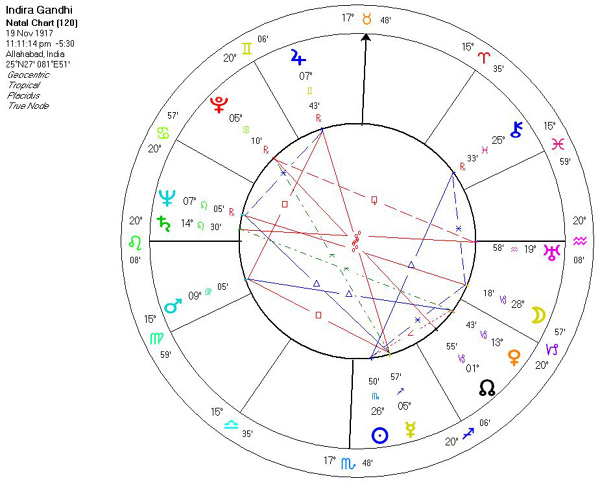
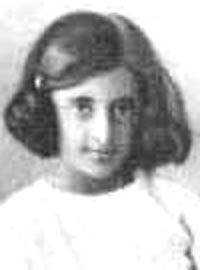
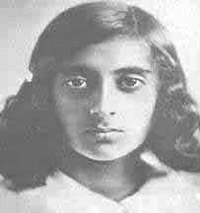
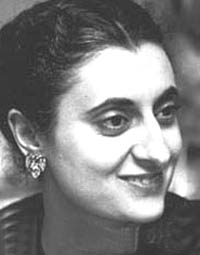

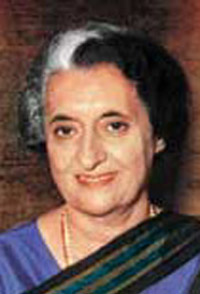
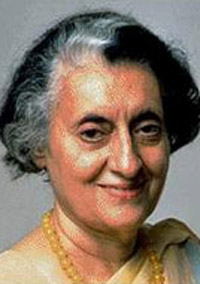
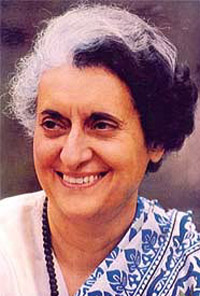
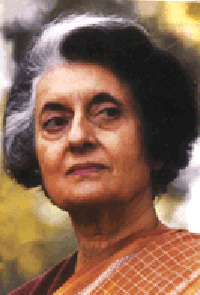
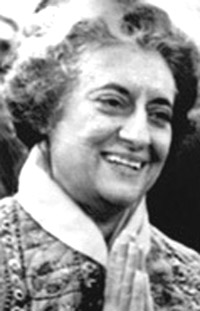
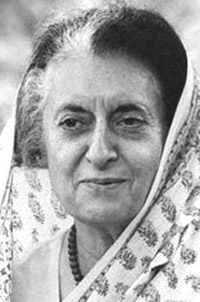
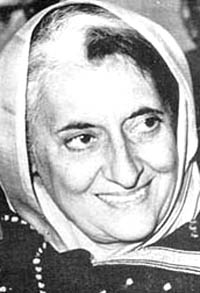 I
I